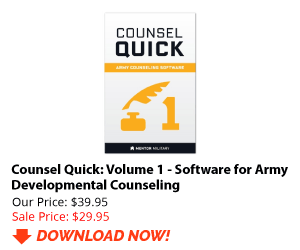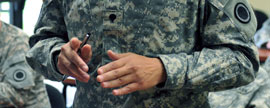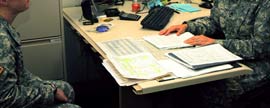Short Answer: Absolutely!
References:
Regarding this questions include but are not limited to: : ADP/ADRP/ 6-22, ATP 6-22.1, FM 7-22.7, and the Military Manual for Courts-Martial/UCMJ.
Definition of Leader with Regard to Counseling Session
As defined by ADP 6-22 Glossary 1: Army leader– Anyone who by virtue of assumed role or assigned responsibility inspires and influences people to accomplish organizational goals. Army leaders motivate people both inside and outside the chain of command to pursue actions, focus thinking and shape decisions for the greater good of the organization. – Glossary 1 ADP 6-22
Counseling Answer:
Yes, any leader within or external to the chain can conduct a counseling session with a Soldier. However when you are not in the Soldier’s direct Chain of Command for example- Squadleader, PLT LDR, CO CDR, BN CDR, BDE CDR, DIV CDR or NCO Support Channel: Squad Leader, PLT SGT, 1SG, CSM, etc. The issue can become emotional.
Some leaders (unfortunately), get very protective of their Soldiers. For example: Aint’ no one counseling my Soldiers but me! It is unfortunate but if this occurs you can take action through the Chain of Command and potentially UCMJ if you cannot obtain the professional support of the Chain of Command or NCO Support Channel.
The goal would be to engage the Chain of Command and get their support on the subject.
What Gives You the Authority to Take Such Action?
If you are not in the Soldier’s Chain of Command it basically comes down to enforcement of General Military Authority and Command Authority found in FM 7-22.7 The NCO Guide. Specifically it states:
Extract of FM 7-22.7
AUTHORITY
2-19. As a noncommissioned officer, you must know what authority you have and where it comes from. You are also expected to use good judgment when exercising your authority.
2-20. Authority is defined as the right to direct soldiers to do certain things. Authority is the legitimate power of leaders to direct soldiers or to take action within the scope of their position. Military authority begins with the Constitution, which divides it between Congress and the President. The President, as commander in chief, commands the armed forces, including the Army. The authority from the Commander-in-Chief extends through the chain of command , with the assistance of the NCO support channel, to the squad, section or team leader who then directs and supervises the actions of individual soldiers. When you say, “PFC Lee, you and PFC Johnson start filling sandbags; SPC Garcia and SPC Smith will provide security from that hill,” you are turning into action the orders of the entire chain of command.
2-21. In the Army there are two basic types of authority: command authority and general military authority.
2-22. Command authority is the authority leaders have over soldiers by virtue of rank or assignment. Command authority originates with the President and may be supplemented by law or regulation. Even though it is called “command” authority, it is not limited to officers – you have command authority inherent in your leadership position as a tank commander or team leader, for example. Noncommissioned officers’ command authority is inherent with the job by virtue of position to direct or control soldiers.
“It takes guts for an NCO to use inherent authority and responsibility in training, maintaining, leading, and caring for soldiers.”- SMA Glen E. Morrell
2-23. Leading soldiers includes the authority to organize, direct and control your assigned soldiers so that they accomplish assigned missions. It also includes authority to use assigned equipment and resources to accomplish your missions. Remember that this only applies to soldiers and facilities in your unit. For example, if the platoon sergeant of first platoon goes on leave and a squad leader is put in charge, that squad leader has command authority over only first platoon, until he is relieved from the responsibility. The soldiers in first platoon will obey the squad leader’s orders due to his position. However, the squad leader does not have command authority over another platoon.
“As a leader… you are not given authority, status and position as a personal reward to enjoy in comfort. You are given them so that you may be of greater service to your subordinates, your unit and your country.” FM 22-100, Army Leadership (1983)-note this is a reference to a dated manual but still applies.
2-24. General military authority is authority extended to all soldiers to take action and act in the absence of a unit leader or other designated authority. It originates in oaths of office, law, rank structure, traditions and regulations. This broad-based authority also allows leaders to take appropriate corrective actions whenever a member of any armed service, anywhere, commits an act involving a breach of good order or discipline. For example, if you see soldiers in a brawl, you have the general military authority (and the obligation) to stop the fight. This authority applies even if none of the soldiers are in your unit.
2-25. General military authority exists whether you are on duty or not, in uniform or in civilian attire and regardless of location. For example, you are off duty, in civilian clothes and in the PX and you see a soldier in uniform with his headgear raised up and trousers unbloused. You stop the soldier immediately, identify yourself and ensure the soldier understands and makes the necessary corrections. If he refuses, saying you don’t have the authority to tell him what to do because he’s not in your NCO support channel, the soldier is wrong..
2-26. You as an NCO have both general military authority and the duty to enforce standards as outlined in AR 670-1. Your authority to enforce those regulations is specified in AR 600-20 and if you neglect your duty, you can be held accountable. If the soldier refuses to obey you, what can you do? For starters, you can explain that you have authority regardless of your location, your unit, or whether you are in uniform or civilian attire. You may decide to settle for the soldier’s name and unit. If so, a phone call to his first sergeant should be more than enough to ensure that such an incident does not recur.
“Speak with your own voice.”- CSM Clifford R. West
While this manual references NCO you can see the authority is the same for officers.
Potential Solutions:
1. Get support from the Squad leader, Platoon Sergeant etc.
2. Type up a counseling statement and allow the chain of command to review the document. Request you provide the counseling to the Soldier in the presence of the Squad Leader, etc.
3. Allow the Chain of Command to use your counseling statement to construct their own version for your review. Request you be present at the counseling session with the Soldier. Request you be allowed to voice your concerns as to why this was important.
4. If items 1-3 fail and the chain of command is non responisive and the situation warrants consider recommending UCMJ. There is no requirement for a counseling statement when recommending UCMJ.
Do you need a Subordinate Leader’s Permission to Counsel Their Soldier?
You do not need the permission of an NCO or subordinate to counsel a Soldier. If on the other hand someone that out ranks you becomes involved and does not want the counseling to take place it usually becomes a little more difficult. However protecting a Soldier when they are in the wrong is wrong and could under the proper conditions/situation result in that person being counseled or recommended for UCMJ, Letter of Reprimand, etc, for undermining the chain of command or failure to enforce, and/or obey an order regulation, etc.
Bottom line
You have every legal right to counsel a Soldier for a deficiency. It is best to have the Soldiers first line leader and first officer involved (if the incident involved an officer) and gain their support. If they are not supportive of your efforts it could be seen as subverting your authority. Commanders do have a wide range of discretion available in situations like this. It really comes down to one question for an argumentative supervisor:
Sir/Ma’am/Sergeant, if the roles were reversed and you were in my shoes am I to understand you be absolutely find if I did not support your efforts to correct one a deficiency involving one of my Soldiers? On the Other hand if the issue warrants you can recommend UCMJ and avoid the counseling process all together. If the unit command does not support you the issue can be raised to the next level and if the battalion commander supports your position he/she can take the matter to their level and proceed with UCMJ, counseling, etc. Always best to resolve at the lowest possible level.
Magic Formula to Problem Sloving:
Be calm, factual, professional, bring realistic and reasonable solutions to the table. If reasonable efforts fail, run it up the chain. Somewhere in the Chain of Command is an unemotional and reasonable leader!
Related ASKTOP.net Posts
Can an NCO who is not my Squad Leader give me a counseling statement?
Can I counsel a Soldier who is attached to another unit?
Did you find this information useful? Would greatly appreciate your feedback!
TOP















Comments
SSG Schuette
Thank you for this excellent advice. It is very specific to the current situation I am dealing with. I fully intend to move forward with this issue as advised from this site.
Thank you,
SSG Schuette
Mark Gerecht
SSG Schuette, we are always happy when our information is of assistance. I am always looking to connect with Active duty members. Would you be willing to have a phone conversation with me?
Respectfully,
TOP